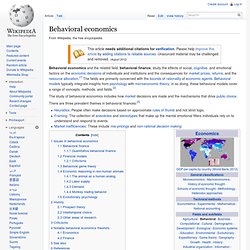

Coaching. Behavioural economics. The Irrationality of Irrationality: The Paradox of Popular Psychology. In 1996, Lyle Brenner, Derek Koehler and Amos Tversky conducted a study involving students from San Jose State University and Stanford University.

The researchers were interested in how people jump to conclusions based on limited information. Previous work by Tversky, Daniel Kahneman and other psychologists found that people are “radically insensitive to both the quantity and quality of information that gives rise to impressions and intuitions,” so the researchers knew, of course, that we humans don’t do a particularly good job of weighing the pros and cons. But to what degree? Behavioural Economics Applied. Behavioral economics. There are three prevalent themes in behavioral finances:[3] Issues in behavioral economics[edit] Behavioral finance[edit]

Applied Behavioral Economics.
Pearltrees videos. Pearltrees tips. Behavioural Economics.